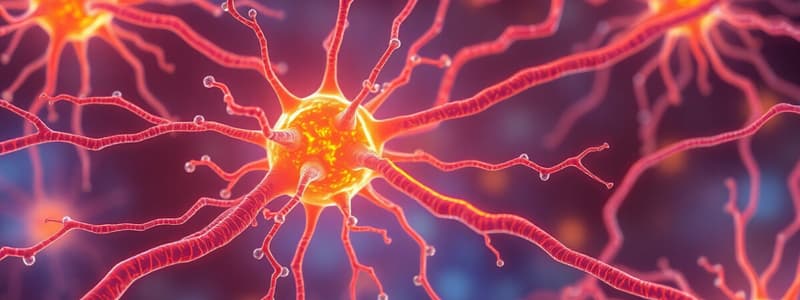Podcast
Questions and Answers
What is the primary function of dendrites in a neuron?
What is the primary function of dendrites in a neuron?
- To support and maintain the neuron
- To control the metabolism of the neuron
- To gather nerve impulses and transmit them to the cell body (correct)
- To carry nerve impulses away from the cell body
Which statement accurately describes the pathway of nerve impulse travel in neurons?
Which statement accurately describes the pathway of nerve impulse travel in neurons?
- Dendrites → Axon → Cell body
- Axon → Cell body → Dendrites
- Cell body → Dendrites → Axon
- Dendrites → Cell body → Axon (correct)
What type of neurons are primarily responsible for transmitting sensory information to the central nervous system?
What type of neurons are primarily responsible for transmitting sensory information to the central nervous system?
- Interneurons
- Sensory neurons (correct)
- Motor neurons
- Glial cells
What is primarily found in the cell body of a neuron?
What is primarily found in the cell body of a neuron?
Which type of neuron typically has the longest axon?
Which type of neuron typically has the longest axon?
Flashcards
What are neurons?
What are neurons?
Neurons are specialized cells that transmit electrical signals (nerve impulses) throughout the nervous system.
What are glial cells?
What are glial cells?
Glial cells support and maintain neurons. They provide structure, insulation, and nourishment to neurons.
Sensory neuron
Sensory neuron
Sensory neurons carry nerve impulses from receptors (like skin, eyes, ears) to the central nervous system (brain and spinal cord).
Motor neuron
Motor neuron
Signup and view all the flashcards
Interneuron
Interneuron
Signup and view all the flashcards
Study Notes
Nervous System Cells
- The nervous system involves a complex network of cells called neurons, responsible for receiving and transmitting electrical signals (nerve impulses).
- Glial cells support and maintain neurons within the system.
- The coordinated activity of billions of neurons facilitates rapid communication and control throughout the body.
Neuron Types
- Neurons are categorized into three types: sensory, interneurons, and motor neurons.
- All neuron types have a cell body, one axon, and several dendrites.
- Axons and dendrites are cytoplasmic extensions, often termed nerve fibers.
- Nerve impulses travel in a specific direction: dendrites → cell body → axon.
Dendrites
- Dendrites receive nerve impulses and transmit them toward the cell body.
- Sensory neuron dendrites form a single, elongated fiber, relaying receptor information to the cell body.
- Interneurons and motor neurons have multiple short dendrites, collecting signals from other neurons and transmitting them to their cell bodies.
Cell Body
- The nucleus and most of the cytoplasm of a neuron are housed in the cell body.
- The cell body controls the cell's metabolic processes.
- It contains clusters of ribosomes, vital for producing proteins, including neurotransmitter-producing enzymes.
- Interneuron cell bodies reside within the central nervous system.
Axon
- The axon is a single nerve fiber that carries nerve impulses away from the cell body.
- Sensory and interneurons transmit the impulse to the next neuron.
- Motor neuron axons are exceptionally long, conveying messages from the cell body to an effector (e.g., a muscle or gland).
Studying That Suits You
Use AI to generate personalized quizzes and flashcards to suit your learning preferences.




